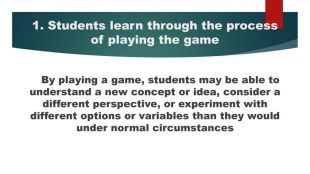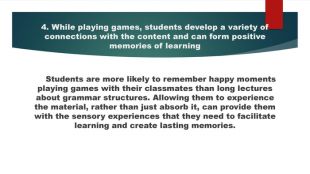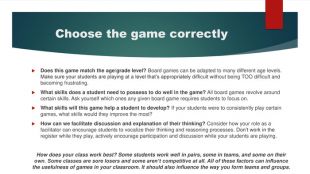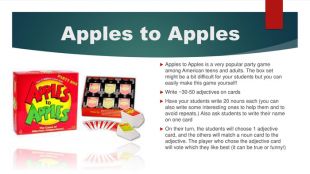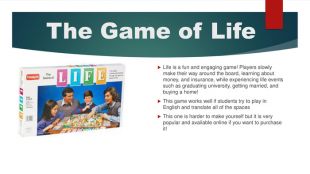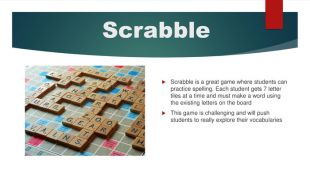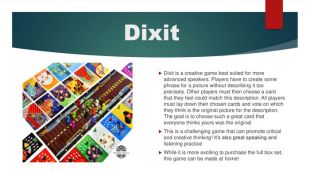Games in the Classroom (making English lessons fun).





















Why Table / Board Games?brain developmentcan be helpful in building social skills and self-esteemopportunity to think, react, adapt, master, compete, and laugh all the way teach kids about rules, competition, fair play, and values.to discover more about ourselves, our friends, and how we interact with others.
4. While playing games, students develop a variety of connections with the content and can form positive memories of learning. Students are more likely to remember happy moments playing games with their classmates than long lectures about grammar structures. Allowing them to experience the material, rather than just absorb it, can provide them with the sensory experiences that they need to facilitate learning and create lasting memories.
Choose the game correctly. Does this game match the age/grade level? Board games can be adapted to many different age levels. Make sure your students are playing at a level that’s appropriately difficult without being TOO difficult and becoming frustrating. What skills does a student need to possess to do well in the game? All board games revolve around certain skills. Ask yourself which ones any given board game requires students to focus on. What skills will this game help a student to develop? If your students were to consistently play certain games, what skills would they improve the most? How can we facilitate discussion and explanation of their thinking? Consider how your role as a facilitator can encourage students to vocalize their thinking and reasoning processes. Don’t work in the register while they play, actively encourage participation and discussion while your students are playing. How does your class work best? Some students work well in pairs, some in teams, and some on their own. Some classes are sore losers and some aren’t competitive at all. All of these factors can influence the usefulness of games in your classroom. It should also influence the way you form teams and groups.
{5940675 A-B579-460 E-94 D1-54222 C63 F5 DA} Board gamestabletop games that involve moving or placing pieces on a surface or "board", following a set of rules. Some games are based on strategy, but many contain an element of chance, and some are purely chance with no element of skill. Card gamesgames using playing cards. They can be traditional cards or game-specific. These games are often games of chance. Dice gamesgames that use one or more dice as their sole or central component. Pencil-and-paper gamesgames that can be played solely with paper and pencil (or other writing implement). Tile-based gamesgames that use tiles as one of the main elements of play. These games use small tiles as playing pieces for gambling or entertainment games. Some board games use tiles to create their board, giving multiple possibilities for board layout, or allowing changes in the board geometry during play. Role-playing gamesgames in which players assume the roles of characters in a fictional setting. Players take responsibility for acting out these roles within a narrative, either through literal acting or through a process of structured decision-making of character development. Actions taken within many games succeed or fail according to a formal system of rules and guidelines. Strategy gamesgames in which the players decision-making skills have a high significance in determining the outcome. Almost all games require internal decision tree style thinking, and typically very high situational awareness.
Apples to Apples Apples to Apples is a very popular party game among American teens and adults. The box set might be a bit difficult for your students but you can easily make this game yourself! Write ~30-50 adjectives on cards. Have your students write 20 nouns each (you can also write some interesting ones to help them and to avoid repeats.) Also ask students to write their name on one card. On their turn, the students will choose 1 adjective card, and the others will match a noun card to the adjective. The player who chose the adjective card will vote which they like best (it can be true or funny!)
The Game of Life. Life is a fun and engaging game! Players slowly make their way around the board, learning about money, and insurance, while experiencing life events such as graduating university, getting married, and buying a home! This game works well if students try to play in English and translate all of the spaces. This one is harder to make yourself but it is very popular and available online if you want to purchase it!
Dixit. Dixit is a creative game best suited for more advanced speakers. Players have to create some phrase for a picture without describing it too precisely. Other players must then choose a card that they feel could match this description. All players must lay down their chosen cards and vote on which they think is the original picture for the description. The goal is to choose such a great card that everyone thinks yours was the original. This is a challenging game that can promote critical and creative thinking! It’s also great speaking and listening practice. While it is more exciting to purchase the full box set, this game can be made at home!
Mafia. Mafia is a game that both students and teachers know and enjoy! You can quite easily use Mafia as a tool in your English lessons or clubs! Before playing you should find the proper phrases in English to control the game, and you should teach the students the names of cards and the names of all of the roles. This role playing card game can be an excellent way to practice both speaking and listening skills, and critical thinking! It’s also a great way to practice storytelling and asking questions.
Resources. To Buy:www.amazon.com https://www.amazon.com/kids-games-board-classic-dvd-travel/b?ie=UTF8&node=166220011 www.ebay.com https://www.cardhaus.com/https://www.miniaturemarket.com/ https://www.coolstuffinc.com/To Print - https://www.education.com/worksheets/printable-board-games/http://homeschoolgameschool.com/free-printable-board-games/https://www.printableboardgames.net/https://www.eslcafe.com/idea/index.cgi?display:952329976-25633.txt (mafia explained in English so you have the right vocabulary!) https://www.fluentu.com/blog/educator-english/esl-card-games/ https://www.mes-english.com/games/boardgames.php


про публікацію авторської розробки
Додати розробку






